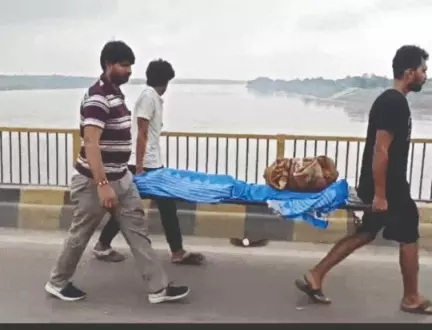Grieving son forced to walk with mother’s body as VIP drives through closed bridge

Hamirpur: On a closed bridge over the Yamuna, where no vehicle was supposed to pass due to urgent repairs, a haunting image unfolded: a daily wager carries a stretcher with help of ambulance driver and medical staff, bearing his dead mother’s body under the blazing June sun—because the rules, meant for all, were bent earlier that morning for a VIP’s vehicle.
This jarring episode occurred on Saturday, when Binda, a labourer from Tedha village, was returning home from Kanpur with the body of his 63-year-old mother, Shiv Devi, who had died during treatment. Around 9:30 AM, his ambulance was stopped at the barricades on the Sumerpur stretch of the Yamuna Bridge—shut since 6:10 AM for repairs. Despite pleading with the police and citing his circumstances, he was told rules were rules: no vehicle, not even one carrying a corpse, could be allowed. But what stung most
was what had transpired
just hours earlier. At 6:44 AM—barely 34 minutes after the closure—security forces had made way for the car of a local BJP legislator, allegedly ferrying the MLA’s ailing brother to Kanpur. The preferential treatment exposed a deep rot: regulations are strictly enforced for the voiceless, but are negotiable for those with influence.
Denied passage, Binda placed his mother’s body on a stretcher and began walking the nearly one-kilometre stretch across the bridge, his head bowed in grief. He made the solitary journey as cars stood still and passersby watched in stunned silence, unwilling or unable to help. On the other side, he flagged down an auto-rickshaw to complete the journey to his village—where relatives waited to perform the last rites.
The contrast was glaring. A VIP car whisked past barriers hours before. A poor man, devastated and alone, trudged across with the dead. The image has since ignited public anger and underscored the entrenched inequality that defines access not just to roads and rules, but to dignity itself.
The bridge, located on the busy Kanpur-Sagar highway, had been closed for two days for repairs on pillar number 10. Officials claimed vehicular restrictions were necessary to replace and grease bearings. Pedestrian movement was allowed, but exceptions—always unofficial—were evidently made.
This was not an isolated case. Just a week earlier, on June 21, a senior bureaucrat’s convoy had crossed the same bridge after the official ban was enforced. That incident too went without administrative explanation or accountability.
For locals, especially in villages around Sumerpur, this is not merely about a closed road. The alternative route via Kurara and Manki is treacherous and nearly unusable. It stretches 25 kilometres, of which over 10 are potholed, cratered or eroded into slush. What should be a 50-minute drive often takes over two hours. Small vehicles get stuck. Heavier ones avoid it altogether, diverting through far-off hamlets like Jolhupur.
In such a scenario, the bridge closure was always going to hurt the most vulnerable. But what stings deeper is that rules intended to serve public safety were casually waived for the well-connected, while a man in mourning was shown no such courtesy.
Police officers deployed at the barricades justified their actions by pointing to official orders. “We are managing a difficult situation,” said one of them. But none could explain how the barricades opened for a politician’s car but remained firmly shut for an ambulance carrying a corpse.
In India, where access to basic services already follows a hierarchy, incidents like this peel away the façade of equal treatment under law. That Binda had to physically carry his mother’s body across a sun-scorched bridge while VIP cars moved freely is more than a lapse in protocol—it is a brutal reminder of whose grief matters.
No political leader visited the family. No bureaucrat issued an apology. No assurance came that such discrimination would not happen again. The system, as it often does, moved on.
What remained was the silent weight of loss—of a mother, of dignity, and of hope that the state will someday stand for all, not just a few. The bridge at Sumerpur is being repaired. But it is a society that remains broken—where the powerful ride through barriers, and the powerless carry their dead on foot.



